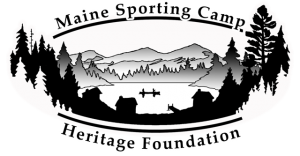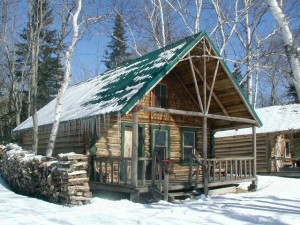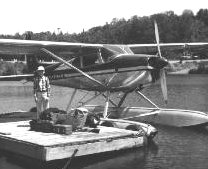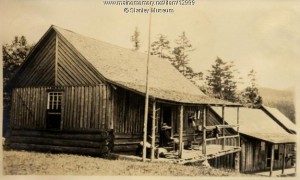The Maine Sporting Camp Heritage Foundation was founded to preserve Maine’s sporting camp heritage and the natural resources they rely upon.
The Maine Sporting Camp Heritage Foundation’s challenge is to raise $20 million to support the Foundation’s mission and programs. Monies raised will come from individuals, corporations and foundations, as well as historical and land conservation partnerships.
Mission
The Maine Sporting Camp Heritage Foundation’s mission is to preserve Maine’s sporting camps and the natural resources they rely upon so that future generations will continue to have access to some of Maine’s most wild and scenic locations, and will be able to enjoy the special outdoor heritage and recreation experiences that Sporting Camps offer.
The Foundation achieves this through educating the public about Maine’s sporting camp heritage and their surrounding natural resources; building coalitions to support conservation of the natural habitats and wildlife depended upon by sporting camps; and providing marketing and business assistance, grants, and “patient capital”, in order to restructure the economics of Sporting Camp operations.
An important outcome is the strengthening of local economies that depend on the continued operation of one or more traditional sporting camps. In addition, further economic deterioration and increased unemployment in the communities whose economies depend to a large extent on visitors to these traditional Maine sporting camps will be limited.
Challenges and Opportunities Facing Maine’s Sporting Camps
For over 150 years, Maine’s sporting camps have served outdoor enthusiasts with lodging, meals and recreational access to some of the State’s most beautiful and remote natural locations.
During this time, many sporting camps have created and preserved an architectural style unique to Maine, known simply as the “Maine Sporting Camp Style.” Many of these hand hewn log cabins have been in continuous use for over 100 years.
This heritage has been seriously threatened by changes in land ownership and land management policies, high land valuations and taxes, lack of long term land leases, business complexities and regulation, lack of affordable capital, encroaching development and lack of access to lands and waters where visitors may enjoy their favorite recreational activities.
Many of Maine’s sporting camps have already been converted into exclusive private vacation properties by individuals who are able to buy these typically waterfront properties at prices far higher than a commercial sporting camp business could support.
As commercial sporting camps are lost, the industry comes dangerously close to losing its critical mass and disappearing altogether along with the valuable public access and recreational opportunities they provide.
Programs and Services
The Foundation’s programs and services include:
1. Technical Assistance in the areas of:
- Business & Financial Management
- Marketing & Product Development
- Multi-Generation Ownership Transition Planning
- Management Transition Planning
- Workforce Training
2. Financial Capital to:
- Upgrade facilities and make them more suitable for today’s visitors
- Assist camp owners in buying underlying lands when landowners decide to sell
- Purchase underlying lands and then offer affordable long term leases
- Provide buffer zones around the Sporting Camps by purchasing surrounding lands, shorelines and special wildlife habitats in fee or with conservation easements
- Purchase historical sporting camp properties that have already been converted into non-commercial private use, and to re-establish them as commercial sporting camps open to serve the public
3. Technical Advice to assist with:
- Regulatory burdens that threaten sporting camps’ existence
- Creating a Working Waterfront classification for Maine’s Sporting Camps in order to reduce unaffordable property taxes
What is a Traditional Maine Sporting Camp?
Alice Arlen answered this question best when she wrote…
There is a grand tradition that has become an integral part of Maine’s heritage: Unique to the state, and over 140 years old, it is called the Maine sporting camp. Some people think of these camps as “hunting and fishing lodges.”
They are that, but they are also much more. Nearly all sporting camps are on a lake or river, generally in a remote area of forested land. Most have buildings made of peeled and chinked logs with porches looking over the water. The guest sleeping cabins are clustered near the shore around a central dining lodge. Plumbing was (and often still is) “out back.” Primitive, and in harmony with their surroundings, sporting camps have the appearance of having grown out of the ground.
New Hampshire and Vermont have private hunting and fishing clubs and game preserves. New York, in the Adirondacks, has private camps and rustic estates. But Maine sporting camps are open to paying customers and are a cultural and entrepreneurial resource distinctive to the state.
Several factors came together to produce the Maine sporting camps.
You can read her entire article here….
Foundation Management
The Foundation’s CEO is John D. Rust. John brings a background in marketing and as a business consultant specializing in the outdoor recreation and lodging industry, primarily in the Moosehead and Katahdin regions. John also currently serves on the Piscataquis County Tourism Development Authority), and is a board member of Maine Woods Forever.
John holds an engineering degree from Rensselaer Polytechnic Institute and a MBA with marketing specialty from UCLA’s Anderson School of Management. John grew up in York, Maine, where tourism is vital, and where his family owned a restaurant, ocean-front motel, guest lodge, and summer rental cottages.
A lifelong outdoorsman, John is a Registered Master Maine Guide and a Life Member of the Maine Professional Guides Association where he served nine terms as Vice President and then served as the Association’s first Executive Director. John chaired several of the Association’s committees including that on the Allagash Waterway, and represented Maine Guides on the Maine Tourism Commission. John’s guiding activities include canoe trip outfitting, brook trout fishing, hunting and wildlife watching.




